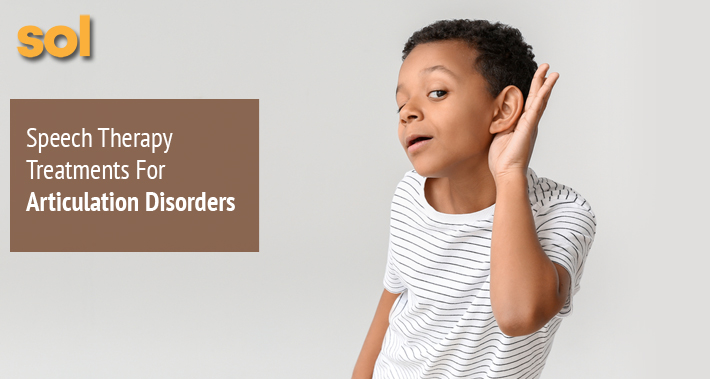
Is your child leaving certain sounds off of words?
Do they have trouble pronouncing certain words?
And do they seem to be falling behind in their speech development?
If so, this may be a sign of an articulation disorder, which is a type of speech sound disorder.
And knowing where you can access speech therapy for speech sound disorders for your child is very important.
Not only can a speech and language therapist help treat speech articulation problems, but they can also help diagnose them.
But kids always talk a little funny at first, right?
How do you know if it’s an articulation disorder?
Keep reading as we explore the topic.
What Is Articulation Disorder?
The word articulation refers to the ability to say words correctly.
If your child has difficulty with this, they may have an articulation disorder.
A child with an articulation disorder is often behind their peers in their language development.
If your child has an articulation disorder, they may have trouble making certain sounds when speaking.
While this is normal in young children, typically your child should grow out of it.
That’s why it’s important to assess your child’s developmental speech milestones in relation to where they should be.
RELATED: What Speech Development Milestones Should Your Child Reach?
Are There Different Types Of Articulation Disorders?
There are four different kinds of articulation disorders: substitution, omission, distortion, and addition.
Substitution happens when your child substitutes one sound for a different sound most of the time.
Substitution might sound like using a “w” instead of an “r”, so your child says “wabbit” instead of “rabbit.”
Omission is when your child leaves out a syllable of a word.
This might sound like saying “nana” instead of “banana” because it’s easier for your child to say.
If your child experiences distortion, it usually involves changing a sound consistently.
For example, your child might say an “s” sound as a “th” sound.
Finally, if your child experiences addition, they might add syllables to words.
If your child uses addition, they might say something like “puh-lay” instead of “play”.
How Do You Know If Your Child Has An Articulation Disorder?
If your child has an articulation disorder, their speech sounds different than it should at their developmental level.
For example, by age 3, a stranger should be able to understand your child about half the time.
By age 5, your child should be able to say most sounds correctly.
By age 8, they should be able to make pretty much every speech sound correctly.
If your child hasn’t met these milestones or is embarrassed by their speech, it’s a sign that you should have them assessed by a professional.
What Causes Articulation Disorder?
There are many different causes for articulation disorders.
Sometimes, children struggle because the muscles they need to make proper speech sounds are weak.
Other times, it might be because their brain has trouble telling their speech muscles when to move, although this is less common.
If your child has other disorders, they may lead to articulation disorders.
These disorders might include things like:
- Cerebral palsy, a head injury, or other form of brain damage
- Down syndrome or another genetic syndrome that weakens muscles
- Autism spectrum disorder
- Hearing loss
RELATED: How Can Frequent Ear Infections Affect Speech Development?
Is Articulation Disorder A Disability?
Articulation disorders are recognized as a disability because they impact your child’s ability to socialize and, with some children, their performance at school.
However, with early intervention and speech therapy treatment, your child may overcome their articulation disorder.
With appropriate treatment, many children can go on to learn to speak normally or at least close to normally.
So, while articulation disorder is considered a disability, it’s not necessarily a lifelong one.

Can Articulation Disorder Be Corrected With Speech Therapy?
Speech therapy can help your child with their articulation disorder.
Many children are able to speak completely normally after treatment or at least close to normally.
Speech therapists can help with articulation disorders in a couple different ways.
Firstly, your child’s speech therapist can help them learn how to make the appropriate speech sounds they need.
They can also help your child learn to identify correct and incorrect sounds.
Then, your child’s speech therapist will practice making correct sounds in different words and longer sentences.
The earlier your child receives treatment, the more it will help them.
Book Your Appointment With Sol Speech And Language Therapy Today
If your child’s speech is causing them confidence problems, or if they’re just hard to understand, Sol Speech and Language Therapy can help.
Book your appointment with Sol Speech And Language Therapy today.
6448 E Hwy 290 Suite E-108,
Austin, TX 78723
(512) 368-9488
» https://g.page/r/CfRfhOpEQm7BEAE
Sol Speech & Language Therapy
555 Round Rock W Dr E-221,
Round Rock, TX 78681
(512) 808-3953
» https://g.page/r/Cb5pwCTosSEfEBM
Sol Speech & Language Therapy offers personalized skilled intervention to those struggling with their speech and language skills. Services offered include screening, consultation, and comprehensive evaluation. We also provide one-on-one and/or group therapy for speech sound disorders, receptive/expressive language delay/disorder, stuttering/cluttering, accent reduction, and much more.